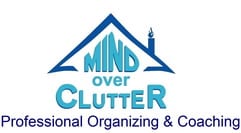What’s Stopping You From Getting Organized?
I asked my colleagues from Professional Organizer in Canada (POC) to share a word or phrase they hear from their clients that causes them to pause. Some phrases will show a mindset of fear, procrastination or indecision making it difficult for you to be successful. My colleagues work in productivity coaching, virtual organizing, downsizing, moving and many other specialized areas to help you get organized. Use the POC directory to find a Professional Organizer who understands you.
Have you said or thought of any of these phrases?

Darlene Tripp owner of Hello Darlene
‘Overwhelmed‘. When they say I am feeling overwhelmed during the session I know it is time for a break or to step away or to even end the session potentially. Sometimes there are triggers or other things that happen and it is so important for them to be in the right frame of mind most importantly!
Laura Kay owner of Toronto Home Organizing
For Now”. As in, “I’ll put this here for now”. This is a stall/indecisive tactic to avoid making a commitment immediately. I’ve always attempted a stop gap when they say that and get them to reconsider.
Kim Diamond owner of Clufferfly Inc.
I hear the word “later” a lot. Clients postpone decisions about their stuff. Maybe they are feeling overwhelmed or it’s a sensitive topic. It needs to be explored or worked through in order to understand the issues about their stuff. As they say, clutter is just postponed discussions.
Adele Lapointe owner of Chaos to Clarity
“I can’t deal with that right now”. As Professional Organizers, we can’t assume we know the reason and we need to find out why. Everyone’s why can be different. For example, it might be a sentimental object that brings back memories good or bad.
Julie Stobbe owner of Mind over Clutter
“Procrastinator” Clients will say I am a procrastinator. When I hear this we pause and talk about how procrastination is affecting their ability to have the home they want to have. Understanding that you are a procrastinator is good. It is not an excuse or reason you can use for putting off doing tasks or telling me why you can’t get things done. It means you need to develop systems to help you stop procrastinating.
Sara Novak owner of Rainbow Home Organizing
“No”. It was a packing/unpacking/organizing job and even though I thought she “should” discard several packs of near-empty expired spices, of which there were duplicates, I respected her wish and didn’t try to convince her otherwise. Getting to know my client’s limits is vital for a good working relationship.
Corrie Goldfinger owner of One Space at a Time Professional Organizing.
“Yes, but…”. I don’t believe this means the client will be unsuccessful, but rather that they may be struggling with change from the way they have always done things. Even when things haven’t been working for them, there can still be something comforting about having sameness in one’s environment. I typically encourage trying an experiment to try something new in these situations, with the option of knowing it can be changed again if it doesn’t work out.
Kerith Paterson owner of Visual Girl Home Therapy
“For now”… as in “I will just put it here for now”. This is an indicator that the item will not be put away where it belongs, and the commitment to do so isn’t there yet. Before the client realizes it, their home will be full of “for now” items (aka clutter). I always (gently) call out my clients on this, and find out when, where and how that item is used in their day-to-day life – and find it a home.
Marie Potter owner of Marie Potter
“What you need in the future” When decluttering clothes a client said due to Covid he doesn’t wear suits much anymore so was difficult to know in the future if they were needed. We did declutter but that unknown made it difficult. Www. Marie potter.ca
Heidi Kachel Professional Organizer at Harmonious Spaces.
“Should” – I ask my clients to stop saying this word. It implies guilt, stress or pressure.
Catherine Barnsley owner of Valley Home Transitions
“I’m a hoarder, and can’t get rid of anything.” That’s more than a word, Julie! Misuse of the word “hoarder” is not helpful if it’s used inappropriately. If someone really can be psychologically diagnosed as a hoarder, that’s another issue and a place for conversation. Are you the right person to be helping them?
We love listening to and helping our clients to be able to make decisions, declutter and get organized. Share some other phrases or words that stop you from getting organized.

Julie Stobbe is a Trained Professional Organizer and Lifestyle Organizing Coach who brings happiness to homes and organization to offices, virtually using Zoom. She has been working with clients since 2006 to provide customized organizing solutions to suit their individual needs and situations. She uses her love of teaching to reduce clutter, in your home, office, mind and time. She guides and supports you to be accountable for your time, to complete projects and reach your goals. If you’re in a difficult transition Julie can coach you to break-free of emotional clutter constraining you from living life on your terms. Online courses are available to help instruct, coach and support your organizing projects. Get started by downloading Tips for Reorganizing 9 Rooms.
Contact her at julie@mindoverclutter.ca


Ah yes, so many familiar phrases. At any given moment these can be very valid reasons. I think the problem comes when we find ourselves using them over and over, putting off dealing with what needs attention.
So fun to see all these perspectives here!
You’re right. Sometimes we need time to make a decision. Taking time helps us to make better decisions. That situation needs to be separated from putting off making decisions or procrastinating.
Yes! I have heard these statements over my 25+ years working with clients (homeowners, parents, and small business owners). All of these statements stop them from completing or taking action. As PO/Productivity experts, we all must have an arsenal of responses for these statements to help the client get back on track. Thanks for sharing this collection.
I like your ideas of an “arsenal of responses” to suit different personalities and situations. Sometimes humour works well. Use it carefully.
I noticed that quite a few people mentioned “for now” or something similar. Long before I knew anything about organizing, I realized that “for now” were deadly words. I knew a couple who bought a house they didn’t love “for now” and were still in it many years later. And my ex and I needed a new tub surround but went for the cheap one “for now” but of course we never replaced it with a better one.
You’re right. Time moves on and we don’t revisit the “for now” decisions. More important things have entered our lives. So the clutter stays around for longer than it is expected. Thanks for your comment.
These phrases are so familiar and ones I’ve heard my clients use. What’s encouraging is how well the organizers listen to their clients’ word choices. When listening at that level, you can gain insight into what your client is experiencing, where their specific challenges appear, and create an opening for curiosity. Recognizing when the client isn’t ready to delve deeper is also important. Sometimes it takes time and patience for the trust to develop enough for those discussions.
Making slow decisions helps to make better decisions. Listening to decide what type of encouragement will help our clients is so important. Creating an opening for curiosity allows the client to see the possibilities that exist if they keep it or let it go without making a commitment right away. Opening doors to new perspectives.
Oh, we know these phrases south of the 49th parallel, too. I don’t think I’ve ever had a client NOT say that they were feeling overwhelmed or experiencing overwhelm, and “for now” is a tough habit to break. And as for procrastination, you’re right that it’s good when they recognize it. I’m always so impressed with your fellow Canadian, Dr. Timothy Pychyl, about WHY we procrastinate, because I really do think understanding that helps us help our clients develop those habits and systems. Great round-robin!
If you delve into procrastination it can be quite easy to eliminate. I find that people procrastinate because there is a problem they don’t know how to solve. If the project is broken into smaller tasks then the problems are smaller and easier to solve. How am I going to organize this room? Big problem. Remove the garbage and recycling first. Easy problem to solve. Where can I recycle some of this stuff? medium problem. Google for answers in your area. And so the job continues making smaller questions that you can solve and keep moving forward.
While I don’t do hands-on organizing anymore, the phrase I used to hear often was “But what if I need it later on?” The fear of needing something and not having it was very real for them. Awesome that your clients have you to guide them through the process.
What if I need it, later on, is a very big fear for clients. I try to ask can you borrow it, can you buy it again, can you use something else instead, will you still be alive? That makes them laugh and does help to put it in perspective.